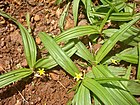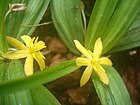Note: This is a project under development. The articles on this wiki are just being initiated and broadly incomplete. You can Help creating new pages.
Curculigo orchioides - Black Musli
Talamuli is a tiny herb that can be seen in the rainy season. They are deep rooted plants with palm like lance shaped leaves and yellow star shaped flowers.
Contents
- 1 Uses
- 2 Parts Used
- 3 Chemical Composition
- 4 Common names
- 5 Properties
- 6 Habit
- 7 Identification
- 8 List of Ayurvedic medicine in which the herb is used
- 9 Where to get the saplings
- 10 Mode of Propagation
- 11 How to plant/cultivate
- 12 Commonly seen growing in areas
- 13 Photo Gallery
- 14 References
- 15 External Links
Uses
Piles, Biliousness, Fatigue, Blood related disorders, Bronchitis, Indigestion, Vomiting, Diarrhea, Lumbago, Gonorrhea, Ophthalmia, Gleet, Hydrophobia.
Parts Used
Chemical Composition
Common names
| Language | Common name |
|---|---|
| Kannada | Nela tengu, Nelathaale gadde, Thaala moolike |
| Hindi | Kali-moosli, Kali-musli |
| Malayalam | Nela-pana-kelangu, Nelappana-kizhanna, Nelppana, Nilappana |
| Tamil | Nilappanang-kizhangu, Nilavilumi, Aiyancu, Aiyancukkilankutalamuli |
| Telugu | Nela-tati-gaddalu, Nelaathadi |
| Marathi | Bhuyimaddi, Kaalimusalee |
| Gujarathi | NA |
| Punjabi | NA |
| Kashmiri | NA |
| Sanskrit | Arshoghni, Bhutali, Mausali, Musalirahi, Mushali, Talamuli, Vrishyakanda |
| English | Black Musli |
Properties
Reference: Dravya - Substance, Rasa - Taste, Guna - Qualities, Veerya - Potency, Vipaka - Post-digesion effect, Karma - Pharmacological activity, Prabhava - Therepeutics.
Dravya
Rasa
Madhura (Sweet), Tikta (Bitter)
Guna
Guru (Heavy), Snigdha (Slimy)
Veerya
Ushna (Hot)
Vipaka
Karma
Vata, Pitta
Prabhava
Habit
Identification
Leaf
| Kind | Shape | Feature |
|---|---|---|
| Simple | Rosette | rhizome to 15 cm long, oblong, perennial. Leaves 10-15 x 2 cm, lanceolate, plicate, base sheathing, pilose, subsessile. |
Flower
| Type | Size | Color and composition | Stamen | More information |
|---|---|---|---|---|
| Bisexual | Solitary | Yellow | 6 | Flowering and fruiting is from January to September |
Fruit
| Type | Size | Mass | Appearance | Seeds | More information |
|---|---|---|---|---|---|
| Fruit baccate; seeds subglobose. | {{{6}}} |
Other features
List of Ayurvedic medicine in which the herb is used
Where to get the saplings
Mode of Propagation
How to plant/cultivate
Tuber segments of 1.5–2 cm size, containing the apical bud, are collected during February–March and used for propagation. [4]
Commonly seen growing in areas
Photo Gallery
References
- ↑ [Chemistry]
- ↑ [FLOWERING PLANTS OF KERALA VER.2, N. Sasidharan Morphology]
- ↑ Ayurvedic properties
- ↑ Cultivation details
External Links
- Ayurvedic Herbs known to be helpful to treat Piles
- Ayurvedic Herbs known to be helpful to treat Biliousness
- Ayurvedic Herbs known to be helpful to treat Fatigue
- Ayurvedic Herbs known to be helpful to treat Blood related disorders
- Ayurvedic Herbs known to be helpful to treat Bronchitis
- Ayurvedic Herbs known to be helpful to treat Indigestion
- Ayurvedic Herbs known to be helpful to treat Vomiting
- Ayurvedic Herbs known to be helpful to treat Diarrhea
- Ayurvedic Herbs known to be helpful to treat Lumbago
- Ayurvedic Herbs known to be helpful to treat Gonorrhea
- Ayurvedic Herbs known to be helpful to treat Ophthalmia
- Ayurvedic Herbs known to be helpful to treat Gleet
- Ayurvedic Herbs known to be helpful to treat Hydrophobia
- Herbs with Leaves used in medicine
- Herbs with Stem used in medicine
- Herbs with Flowers used in medicine
- Herbs with Roots used in medicine
- Herbs with common name in Kannada
- Herbs with common name in Hindi
- Herbs with common name in Malayalam
- Herbs with common name in Tamil
- Herbs with common name in Telugu
- Herbs with common name in Marathi
- Herbs with common name in Sanskrit
- Herbs with common name in English
- Habit - herb
- Index of Plants which can be propagated by Tuber segment
- Herbs that are commonly seen in the region of Tropical area
- Herbs
- Ayurvedic herbs that don't have seed photos
- Hypoxidaceae




